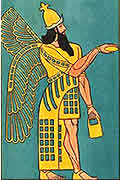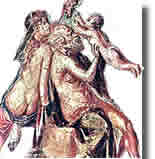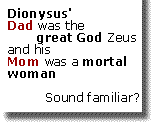| |||||||||||||||||||||||||||||||||
| Facts > Pagan Christs > Dionysus | |||||
| Glycon | Simon | Apollonius of Tyana | Pythagoras | Orpheus | |
| Isis / Osiris | Dionysus | Zalmoxis | Kore | Samothrace | |
| Heroes | Attis | Adonis | Mithras | Other godmen |
| Dionysus 1,200 BC—a dying, resurrected savior |
Was Jesus new? Was Jesus unique? Lets talk about the Pagan godman Dionysus. Dionysus was a Big Name God, He was first worshiped in Thrace (north and east of Greece). He came to Greece by the time Homer wrote the Iliad in maybe 800 BC. His priest Orpheus reworked His legend in the sixth, maybe seventh century BC and by Hellenistic times (after 332 BC) He was worshiped from Italy to Greece and into Egypt and the Middle East. |
| Dating Dionysus |
Birth Dionysus' mom was the mortal woman, Semele; his dad was the supreme God Zeus. Death and resurrection The mysteries of Dionysus celebrated the death of the God in the myth of young Dionysus-Zagreus, who died—was torn apart by the Titans, boiled, and eaten. Only his heart was left; it was buried and from it Dionysus was resurrected and ascended to heaven. Isn't it amazing how ridiculous other peoples' myths are! Salvation Belief in Dionysus brought salvation In Italy, in the fourth century BC, texts written on gold plates and buried with the dead, describe the souls of Dionysus followers in the afterlife, drinking not from one particular spring in Hades, but from another cool pool—and that will give them divinity and eternal life.
|
|||||||||||
|
Greece Herodotus' describes initiation into the mysteries of Dionysus in the fifth century BC. [Herodotus Histories book 4, 78 - 80] Euripides' play about him, the Bacchae, was first performed about 400 BC. Rome
Julius Cesar first formally recognized his mysteries in the mid first century BC [Servillus, Bucolics, 5,29} Palestine Greek Dionysus entered Palestine with Hellenism after Alexander's conquest in 332 BC. In 167 BC Antiochus IV outlawed Jewish temple sacrifice and arranged for the non-Jewish sacrifice of pigs in the Jewish temple at Jerusalem. (Of course some of the Jews were highly pissed at this. You would have been too. The result was the revolt of the Maccabees.) Probably pigs were chosen because they were regularly sacrificed to Dionysus—the Greek God syncretic Hellenism associated with the Jewish God. [Plutarch, Moralia, 67C - 72C; for details of this history, see Everett Ferguson's Backgrounds of Early Christianity, page 383.] |




